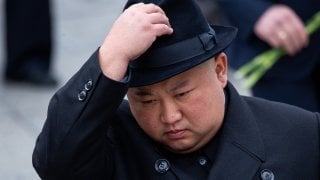Washington and Korean Reunification: What Can America Do?
Korean reunification offers enormous potential for the Korean people and less direct benefits for many others elsewhere. To reap these advantages, many challenges must be overcome. That can be best achieved if the United States seeks to advance the interests of the Korean people and their neighbors as well as Americans. In this effort, Washington should play the long game, seeking a fundamental transformation of Korean relations and Korea’s role in Northeast Asia and beyond.
Many Koreans desired reunification when the United States and the Soviet Union divided the peninsula into separate occupation zones in 1945. Both the Republic of Korea’s Syngman Rhee and North Korea’s Kim Il-sung threatened to use force to restore one Korean nation. Kim acted first and would have succeeded had the United States and its allies not intervened militarily.
After the war-induced hardening of the peninsula’s division, reunification became an aspiration viewed as impractical, if not impossible, by Washington. Although U.S. policymakers had no objection to reunification in principle—indeed, they would have gladly made it an ancillary benefit of defeating the Democratic People’s Republic of Korea—they had little interest in pursuing what they believed would be a wasted effort.
Today, reunification looks to many observers like an even greater lost cause. Younger South Koreans have ever less connections to the DPRK and, hence, even less interest in reunification. The North’s Supreme Leader Kim Jong-un has dropped reunification, peaceful, anyway, as an official state objective, with South Koreans reclassified as “foreigners” rather than benighted co-nationals. As Pyongyang continues to expand its nuclear arsenal and develop ICBMs capable of targeting the U.S. homeland, reunification is on few minds in Washington.
Yet, the ever-compounding short-term crises on the Korean peninsula make long-term planning even more important. It is not enough to dodge day-to-day disasters. American policymakers should consider the end state most beneficial to the Republic of Korea, Northeast Asia, and the United States. Having a final objective in mind would better enable officials to choose short-term policies that are most likely to deliver positive long-term results.
Reunification is one such objective. Other important designs, such as denuclearization, also look like paths to nowhere. However, these issues disproportionately affect either Seoul or Pyongyang. Despite the obvious political headwinds against reunification, it benefits both the South and North (though not necessarily their governments).
The greatest challenge to reunification in Washington is indifference rather than opposition. The DC policy community does not currently take the idea seriously. That will remain a significant challenge in today’s environment, with an overload of vital public policy concerns. Backers must persuade policymakers that reunification is possible, if not probable, and that it would promote regional peace and prosperity while reducing the security challenges facing Washington.
Support for reunification among the Korean neighbors would also advance the process. It is vital to convince other nations, most notably Japan, Russia, and China, that reunification would not undermine their interests. For them, a united Korea, depending on its orientation, could be a competitor, an adversary, or even an enemy. Such fears must be rebutted before it will be possible to persuade skeptical governments of the advantages of Korean reunification.
This process may not be easy. Beijing’s attitude is critical. Allied advocates of a Seoul-led reunification may underestimate the possibility of China seeking to retain the DPRK as a buffer state. Given Russia’s recent dramatic shift toward the North, Moscow might also seek to preserve North Korea in some form. Moreover, Japan might harbor concerns over relations with a more populous and powerful united Korea, especially if reunification occurred amid a nationalist surge in popular opinion. Defusing opposition may be more important than gaining support. Reunification should be presented as a collective positive, not as a weapon for use in other geopolitical disputes.
Rising tensions on the Korean peninsula offer a powerful reminder of the need to improve U.S. relations with both China and Russia. Doing so obviously will not be easy, but both governments today are unwilling to cooperate with the United States and its allies over other issues, ranging across Africa, the Middle East, and Asia. Improving the prospects for peace and prosperity in Northeast Asia is an essential reason to pursue this path.
Unfortunately, both Koreas have been drawn into the Ukrainian conflict. Perhaps a regional initiative could be launched seeking to pull both out of the conflict, an effort that might help encourage broader negotiations to moderate their conflict and move toward reunification.
Indeed, this challenge illustrates Washington’s limitations. Thus, the United States should encourage other nations to make the case for international support for reunification. For instance, Mongolia has long had good relations with both Koreas. Southeast Asian nations also could play a special role. After all, Singapore and Vietnam both hosted Kim-Trump summits, suggesting that they were trusted by Washington and Pyongyang alike. There may be other potential international salesmen. Moreover, NGOs of various sorts and interested peoples, wherever located, also could argue on behalf of the Korean people in both the North and South.
Ultimately, of course, the Korean people must decide on Korean reunification. If they decide otherwise, their choice should be respected. However, the greatest challenge today is that the people of North Korea are not able to freely decide their future any more than they do in the present, which adds to the reasons that reform in the North is essential. Moving Pyongyang in a more liberal, humane, and democratic direction remains the most significant challenge for any Korean policy.
Korean reunification offers enormous potential for the Korean people and less direct benefits for many others elsewhere. To reap these advantages, many challenges must be overcome. That can be best achieved if the United States seeks to advance the interests of the Korean people and their neighbors as well as Americans. In this effort, Washington should play the long game, seeking a fundamental transformation of Korean relations and Korea’s role in Northeast Asia and beyond.
About the Author: Doug Bandow
Doug Bandow is a Senior Fellow at the Cato Institute. A former Special Assistant to President Ronald Reagan, he is the author of Tripwire: Korea and U.S. Foreign Policy in a Changed World and co-author of The Korean Conundrum: America’s Troubled Relations with North and South Korea. This article is drawn from his remarks to the Mongolia Forum on Northeast Asian Peaceful Development and Korean Unification, which was held in early July in Ulaanbaatar.
Image: Shutterstock.com.


